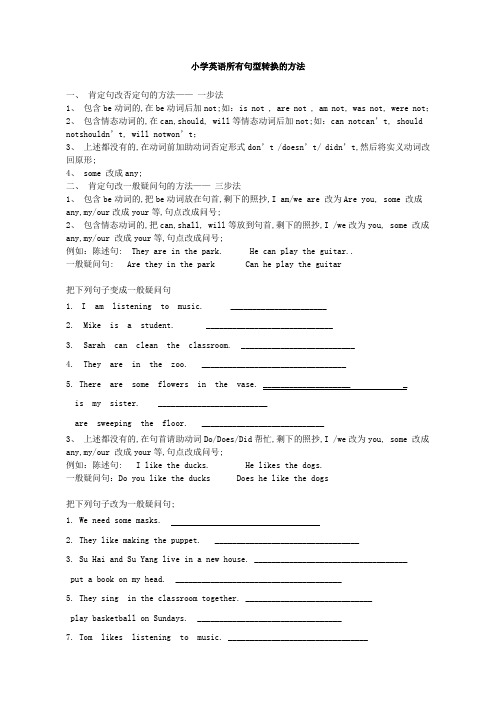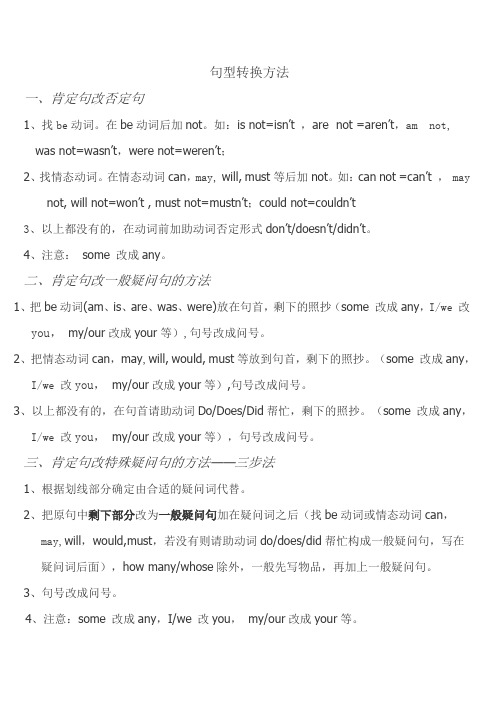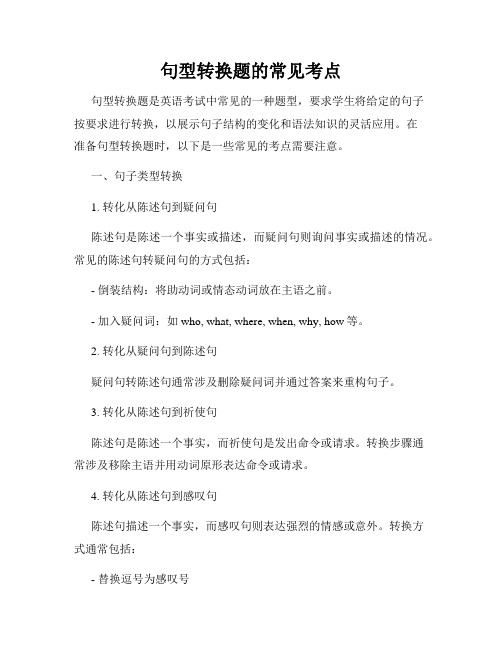情态动词句型转换
小学英语句型转换整理

小学英语所有句型转换的方法一、肯定句改否定句的方法——一步法1、包含be动词的,在be动词后加not;如:is not , are not , am not, was not, were not;2、包含情态动词的,在can,should, will等情态动词后加not;如:can notcan’t, should notshouldn’t, will notwon’t;3、上述都没有的,在动词前加助动词否定形式don’t /doesn’t/ didn’t,然后将实义动词改回原形;4、 some 改成any;二、肯定句改一般疑问句的方法——三步法1、包含be动词的,把be动词放在句首,剩下的照抄,I am/we are 改为Are you, some 改成any,my/our改成your等,句点改成问号;2、包含情态动词的,把can,shall, will等放到句首,剩下的照抄,I /we改为you, some 改成any,my/our 改成your等,句点改成问号;例如:陈述句: They are in the park. He can play the guitar..一般疑问句: Are they in the park Can he play the guitar把下列句子变成一般疑问句1. I am listening to music. ______________________2. Mike is a student. _____________________________3. Sarah can clean the classroom. __________________________4. They are in the zoo. _________________________________5. There are some flowers in the vase. ____________________ _is my sister. _________________________are sweeping the floor. ____________________________3、上述都没有的,在句首请助动词Do/Does/Did帮忙,剩下的照抄,I /we改为you, some 改成any,my/our 改成your等,句点改成问号;例如:陈述句: I like the ducks. He likes the dogs.一般疑问句:Do you like the ducks Does he like the dogs把下列句子改为一般疑问句;1. We need some masks.2. They like making the puppet. _________________________________3. Su Hai and Su Yang live in a new house. ___________________________________put a book on my head. ______________________________________5. They sing in the classroom together. _____________________________play basketball on Sundays. _________________________________7. Tom likes listening to music. ________________________________三、肯定句改特殊疑问句的方法——四步法1、句首添加特殊疑问词根据划线部分确定是什么疑问词;2、划线部分去掉;3、把剩下的句子按照改一般疑问句的方法改完;特例:How many询问数量后紧接物品,EG: How many kites can you see/ How many books are there on the desk 等4、查补某些特殊的句型需要添词或减词;句号改成问号;句型转换题1. The girl is singing in the classroom.改为否定句改为一般疑问句2. They are looking for bag.对画线部分提问3. I am riding my bike now.同上4. There are twelve studens over there.同上5. I can speak English.改为一般疑问句6. I am writing now.同上7. I have a desk and a chair.用He做主语改写句子8. She is buying some food in the supermarket.改为否定句9. I am ill. 对画线部分提问10. Does she like growing flowers 给予否定回答11. I will make model planes with my classmates on Sunday. 对画线部分提问12. The girl dances beautifully.改为感叹句13. The waiter and the waitress play table tennis every day. 改为否定句14. The boy is standing on the man's shoulders.改为一般疑问句15. It's ten o'clock.对画线部分提问关于特殊疑问词组针对人提问谁 /何人 who 地点何地 where 原因 why时间何时 when what time 方式方法程序怎样 how年龄 how old 体重 how heavy 长度 how long 身高 how tall可数名词问多少 How many 不可数名词问多少,多少钱 How much东西职业事物什么 what颜色 what color 时刻 what time选择某一个 which练一练1、A: _______ is the boy in blue B:He’s Mike.2、A: _______ pen is it B:It’s mine.3、A: _______ is the diary B:It’s under the chair.4、A: is the Chirstmas DayB: It’s on the 25th of December.5、A: _______ are the earphones B:They are 25 yuan.6、A: _______ is the cup B:It’s blue.7、A: _______ is it today B:It’s Sunday.8、A: _______ was it yesterday B: It was the 13th of October.9、A: _______ this red one B:It’s beautiful.10、A: Can I have some paper and some crayonsB: _______ A: I want to make a kite.12、A:_______ is your cousin B: He’s 15 years old.13、A:_______ do you have dinnerB: At 6 o’clock.1.He does well in Maths. 改为否定句2.Mike runs as fast as Ben. 改为一般疑问句3.I get up at six thirty every day. 用yesterday morning every day is good at English and Maths. 对画线部分提问5.Ben runs fast. I run faster. 两句合并为一句6. The policeman caught the thief. 改为一般疑问句,作否定回答7.He is thirty kilos. 对画线部分提问8.Turn right at the third crossing. 改为否定句9.Are they American cars 改为单数10.Don’t go along this street.改为肯定句11.Give the purse to me. 换一种说法,句意不变12.The policeman caught the thief. 改问现在进行时13. I get to the shopping center by bus. 对画线部分提问14.It always rains in summer there. 改为一般疑问句,作肯定回答15.It’s cold in winter there. 对画线部分提问16.I like autumn best. 改为否定句17.Su Yang is asking Ben some questions. 对画线部分提问18.Please turn off the light. 改为否定句know his telephone number. 改为一般疑问句20.The children have school today. 改为否定句’d like to join them.改为一般疑问句are going to see a film tomorrow. 对画线部分提问like collecting stamps and singing. 改为否定句24.He often cleans his bedroom. 改为一般疑问句25. Liu Tao is watering flowers in the garden. 对画线部分提问26.David and Mike are going to planting trees this afternoon. 对画线部分提问27.He did his homework in the classroom. 改为否定句Bing is heavier than Gao Shan. 对画线部分提问jumps as far as Mike. 改为否定句see a man behind me. 改为一般过去时boy can jump higher than the girl. 改为否定句is hot in summer in New York. 对画线部分提问34.Liu Ting needs some pencils. 改为否定句35.She is an English girl. 变为复数36.They are our women doctors. 变为单数37.Mary can fly. 变为一般疑问句,并作否定回答38.I like playing football. 改成第三人称单数he39.He has a brother. 改为一般疑问句40.Nancy drew some pictures yesterday. 改为否定句41. Liu Tao usually reads newspaper. 改为过去时1.The children had a good time in the park. 否定句:______________________________2.一般疑问句:_____________________________________3.2. There were about nine hundred people at the concert音乐会. 否定句:_____________________________________ 一般疑问句:_____________________________________ 对划线部分提问:____________________________________4.There was only one problem. 否定句:_____________________________________一般疑问句:_____________________________________肯定/否定回答:____________________________________5.Ann did her homework yesterday evening. 否定句:_______________________________一般疑问句:_____________________________________对划线部分提问:____________________________________st week I read an English book. 否定句:_____________________________________一般疑问句:_____________________________________肯定/否定回答:____________________________________ 对划线部分提问:____________________________________7.My brother was in the park just now. 否定句:__________________________________一般疑问句:_____________________________________ 肯定/否定回答:____________________________________ 对划线部分提问:____________________________________8.She had some bread for lunch today. 否定句:____________________________________ 一般疑问句:_____________________________________肯定/否定回答:____________________________________9.They read English last night. 否定句:__________________________________________ 一般疑问句:________________________________________ 肯定/否定回答:____________________________________ 对划线部分提问:____________________________________。
小学情态动词的句型转换讲解及练习

小学情态动词的句型转换讲解及练习情态动词是英语语法中的一个重要组成部分,是文章中用于表达推测、猜测、建议等含义的动词。
小学阶段是英语语言研究的重要时期,因此了解情态动词的正确使用十分必要。
什么是情态动词情态动词是一种助动词,常常用于表示某种能力、必要性、愿望、推测等情况。
动词本身表示的是动作或状态,而情态动词则表示说话人的态度或语气。
常见的情态动词有:- can- could- may- might- must- shall- should- will- would情态动词的句型转换在句子中,情态动词的位置可以变化,因此我们可以利用这一点来进行句型的转换。
以下是一些常见的情态动词句型转换:1. 直述句→ 疑问句直述句:They can swim.疑问句:Can they swim?2. 直述句→ 否定句直述句:He should finish his homework.否定句:He should not finish his homework.3. 直述句→ 疑问句+否定句直述句:You may eat the cake.疑问句+否定句:May you not eat the cake?现在我们来做一些练,更好地掌握情态动词的句型转换。
练题1. 直述句:They can play the guitar.疑问句:否定句:2. 直述句:She should go to bed early.疑问句+否定句:3. 直述句:I will finish my homework tomorrow.否定句:疑问句+否定句:练答案1. 直述句:They can play the guitar.疑问句:Can they play the guitar?否定句:They cannot play the guitar.2. 直述句:She should go to bed early.疑问句+否定句:Shouldn't she go to bed early?3. 直述句:I will finish my homework tomorrow.否定句:I will not finish my homework tomorrow.疑问句+否定句:Won't I finish my homework tomorrow?以上是小学情态动词的句型转换讲解及练习,希望能对您有所帮助。
初中知识点归纳情态动词的情态与用法与句型转换

初中知识点归纳情态动词的情态与用法与句型转换初中知识点归纳:情态动词的情态、用法与句型转换情态动词是指用来表示说话人的语气、态度、意愿、推测等情态的一类动词。
在英语中,常见的情态动词有can, could, may, might, must, shall, should, will, would, ought to等。
它们在句子中常常起辅助动词的作用,用来修饰句子中的行为动词,表达说话人对某种情态的态度或意愿。
本文将围绕情态动词的情态和用法展开,并介绍如何进行句型转换。
一、情态动词的情态情态动词的情态表示说话人对某种行为或状态的态度或意愿。
下面是几种常见的情态及其对应的情态意义:1. can情态意义:能够、会、可以示例句:I can swim.(我会游泳。
)2. could情态意义:(过去)会、可以示例句:When I was younger, I could run faster.(当我年轻的时候,我跑得更快。
)3. may情态意义:可能、可以示例句:May I go to the restroom?(我可以去洗手间吗?)4. might情态意义:可能、也许、或许示例句:He might be late for the meeting.(他可能会迟到会议。
)5. must情态意义:必须、肯定示例句:You must finish your homework before going out.(你在外出之前必须完成作业。
)6. shall情态意义:将会、应该示例句:Shall we go for a walk?(我们去散步好吗?)7. should情态意义:应该、应当示例句:You should apologize for what you said.(你应该为你所说的道歉。
)8. will情态意义:将要、愿意、要示例句:I will help you with your project.(我愿意帮你完成项目。
句型转换规则归纳

句型转换规则归纳-CAL-FENGHAI.-(YICAI)-Company One1句型转换规则归纳1.含有be动词(am, is, are)的句子,改为否定句是在be动词后面加not,原来句子中的some改为any; 改为一般疑问句的时候,将be动词直接放到句子的最前面,原来句子中的some改为any,句号改为问号。
((如果主语是第一人称则变成第二人称))1)There is a house in the forest. (肯定句)There is not a house in the forest. (否定句) is not=isn’tIs there a house in the forest(一般疑问句)2)There are some classrooms in the school. (肯定句)There are not any classrooms in the school. (否定句) are not=aren’tAre there any classrooms in the school(一般疑问句)3) I am a new student. (肯定句)I am not a new student. (否定句) am not没有缩写形式Are you a new student (一般疑问句)(主语是第一人称I时,改为一般疑问句时主语要变为第二人称you)2.含有情态动词如:can, may ,must, would,should ,could, will 的句子,改否定句时直接在情态动词后面加not, 原来句子中的some改为any; 改为一般疑问句的时候,将情态动词直接放到句子的最前面,原来句子中的some改为an y,句号改为问号。
((如果主语是第一人称则变成第二人称))1)I can play basketball. (肯定句)I can not play basketball. (否定句) can not = can’tCan you play basketball(一般疑问句)3.不含有be动词,也没有情态动词的句子,改为否定句的时候需要借助助动词don’t和doesn’t来否定,原来句子中的some改为any; 改为一般疑问句的时候需要借助Do, Does来提问,原来句子中的some改为any,句号改问号。
句型转换方法

句型转换方法一、肯定句改否定句1、找be动词。
在be动词后加not。
如:is not=isn’t ,are not =aren’t,am not,was not=wasn’t,were not=weren’t;2、找情态动词。
在情态动词can,may, will, must等后加not。
如:can not =can’t ,maynot, will not=won’t , must not=mustn’t;could not=couldn’t3、以上都没有的,在动词前加助动词否定形式don’t/doesn’t/didn’t。
4、注意:some 改成any。
二、肯定句改一般疑问句的方法1、把be动词(am、is、are、was、were)放在句首,剩下的照抄(some 改成any,I/we 改you,my/our改成your等),句号改成问号。
2、把情态动词can,may,will, would, must等放到句首,剩下的照抄。
(some 改成any,I/we 改you,my/our改成your等),句号改成问号。
3、以上都没有的,在句首请助动词Do/Does/Did帮忙,剩下的照抄。
(some 改成any,I/we 改you,my/our改成your等),句号改成问号。
三、肯定句改特殊疑问句的方法——三步法1、根据划线部分确定由合适的疑问词代替。
2、把原句中剩下部分改为一般疑问句加在疑问词之后(找be动词或情态动词can,may,will,would,must,若没有则请助动词do/does/did帮忙构成一般疑问句,写在疑问词后面),how many/whose除外,一般先写物品,再加上一般疑问句。
3、句号改成问号。
4、注意:some 改成any,I/we 改you,my/our改成your等。
句型转换题的常见考点

句型转换题的常见考点句型转换题是英语考试中常见的一种题型,要求学生将给定的句子按要求进行转换,以展示句子结构的变化和语法知识的灵活应用。
在准备句型转换题时,以下是一些常见的考点需要注意。
一、句子类型转换1. 转化从陈述句到疑问句陈述句是陈述一个事实或描述,而疑问句则询问事实或描述的情况。
常见的陈述句转疑问句的方式包括:- 倒装结构:将助动词或情态动词放在主语之前。
- 加入疑问词:如who, what, where, when, why, how等。
2. 转化从疑问句到陈述句疑问句转陈述句通常涉及删除疑问词并通过答案来重构句子。
3. 转化从陈述句到祈使句陈述句是陈述一个事实,而祈使句是发出命令或请求。
转换步骤通常涉及移除主语并用动词原形表达命令或请求。
4. 转化从陈述句到感叹句陈述句描述一个事实,而感叹句则表达强烈的情感或意外。
转换方式通常包括:- 替换逗号为感叹号- 添加感叹词如"How"、"What"等二、时态的转换时态转换是句型转换题的另一个常见考点。
学生需要根据句子的时间和时态要求进行相应的变化。
1. 一般现在时转换一般现在时可以转换为以下几种时态:- 一般过去时:改变动词的时态,通常是在动词后面加上-ed或改变词形。
- 现在进行时:动词变为现在分词的形式(-ing)并加上be动词。
- 现在完成时:动词变为过去分词的形式(-ed)并加上have/has。
2. 一般过去时转换一般过去时可以转换为以下几种时态:- 一般现在时:改变动词的时态,通常是在动词后面去掉-ed或改变词形。
- 过去进行时:动词变为过去分词进行形式(-ing)并加上be动词。
- 过去完成时:动词变为过去分词的形式(-ed)并加上had。
3. 一般将来时转换一般将来时可以转换为以下几种时态:- 一般现在时:使用正确形式的助动词(will,shall)或表示将来的词汇(tomorrow, next week)。
句型转换习题及答案
句型转换练习题改为一般疑问句1、先找be动词am, is, are, was, were或情态动词can, may ,must, would,should ,could .如果有这些词,直接把这些词放在句子最前面,some 改成any,句号改成问号!其余照抄;(如果主语是第一人称则变成第二人称)2、如果句子中没有be动词或者是情态动词,要在句子最前面加助动词do 、does 或者是did。
首先判断句子时态,如果句子是过去式,则要在句最前面加Did,后面动词用原型,some改成any,句号改成问号,其余照抄;(如果主语是第一人称则变成第二人称)如果句子不是过去式,则判断是否为第三人称单数,如果第三人称单数,要在句子最前面前加助动词Does,后面动词用原型,some 改成any,句号改成问号,其余部分照抄。
(如果主语是第一人称则变成第二人称)其他情况均要在句子最前面加助动词do,some改成any,句号改成问号,其它部分照抄. (如果主语是第一人称则变成第二人称)改为否定句1、先找be动词am, is, are, was, were或情态动词can, may ,must, would,should ,could .如果有这些词,直接在这些词的后面加not,some 改成any,其余照抄;2、如果句子中没有be动词或者是情态动词,要在动词前面加don’t、doesn’t 或者是didn’t。
首先判断句子时态,如果句子是过去式,则要在动词前面加didn’t,后面动词用原型,some改成any,其余照抄;如果句子不是过去式,则判断是否为第三人称单数,如果第三人称单数,要在动词前面前加doesn’t,后面动词用原型,some 改成any,其余部分照抄。
其他情况均要在句子动词前面加don’t,some改成any,其它部分照抄.对划线部分提问第一步:先把句子改成一般问句第二步:把提问部分省略,在句子最前面加疑问词。
初中英语句型转换(陈述句变一般疑问句特殊疑问句及练习)
3 加 doesn't/ did n’t 的句子注意,句子动词要变成原型。
二、 肯定句改一般疑问句的方法——三步法
1. 有 be 动词/情态动词:be 动词/情态动词提到句首,其余照抄,句末用问号。
2. 无 be 动词/情态动词,在句首加 Do/Does/Did,其余照抄,句末用问号。
注意(some 改成 any,第一人称变为第二人称 my 改成 your , I 改成 you,we 改成 you,our 改成 your )
Can he play the guitar?
Does he like the dogs?
特殊疑问词的用法
who whom what which
whose what color What time when where why how
how old
意思 谁 谁
什么 哪一个
谁的 什么颜色
用法 问人的身份,姓 名等 问人的身份,姓 名等(问宾语) 问人的职业或 事物是什么 问一定范围内 特指的人或物
how long 多久
问一段时间, He has lived here for a year.
问物体的长短 How long has he lived here?
The desk is one meters long.
How long is the desk ?
how often 多久
问频率
I go to see my parents once a month.
一般疑问句: Are they in the park?
Can he play the guitar?
Does he like the dldren have a good time in the park. 否定句:___________________________________ 一般疑问句:___________________________________ 2. There are about nine hundred people at the concert.(音乐会) 否定句:_________________________________ 一般疑问句:________________________________________ 对划线部分提问:____________________________________ 3. There is only one problem. 否定句:_____________________________________ 一般疑问句:________________________________________ 肯定/否定回答:____________________________________ 4. Ann does her homework every evening. 否定句:__________________________________________ 一般疑问句:________________________________________ 对划线部分提问:____________________________________ 5. I read an English book every day. 否定句:__________________________________________ 一般疑问句:________________________________________ 肯定/否定回答:____________________________________ 对划线部分提问:____________________________________ 6. My brother is in the park now. 否定句:____________________________________ 一般疑问句:________________________________________ 肯定/否定回答:__________________________ 对划线部分提问:____________________________________ 7. She has some bread for lunch today. 否定句:__________________________________________ 一般疑问句:_________________________________ 肯定/否定回答:____________________________________ 8. They read English every day. 否定句:___________________________________ 一般疑问句:________________________________________ 肯定/否定回答:____________________________________ 对划线部分提问:____________________________________
句型转换、翻译句子练习题
句型转换、翻译句子练习题句型转换、翻译句子一、句型转换涉及的动词分类:1. 情态动词:can may would will should could…2. be动词:am is are (过去式:was were)3. 助动词:do does did二、句子分类:①有情有be(句子中有情态动词或者有be动词)②无情无be(句子中既没有情态动词也没有be动词)三、有情有be类型:A. 肯定句变否定句1. This is my book. ----- This is not my book. is not = isn’t are not = aren’t2. I can sing a song. ----- I can not sing a song. can not= can’t总结口诀:有情有be变否定,情be后加not。
B. 肯定句变疑问句1. This is my book. -----Is this your book?2. I can sing a song. -----Can you sing a song?总结口诀:有情有be变疑问,情be提至句首并大写,一二人称转换,句末句号改问号。
四、无情无be类型:A. 肯定句变否定句I like to fly a kite. ----- I don't like to fly a kite.do not = don’t does not = doesn’tShe went to the cinema last night. ----- She didn’t go to the cinema last night. did not = didn’t总结口诀:无情无be变否定,借助do, does, did,do, does, did 后加not, 后面动词现原形。
B. 肯定句变疑问句I like to fly a kite.----- Do you like to fly a kite?She went to the cinema last night. ----- Did she go to the cinema last night?总结口诀:无情无be变疑问,借助do, does, did,do, does, did 提至句首并大写,一二人称转换,后面动词现原形,句末句号改问号。
初中英语句型转换(陈述句变一般疑问句特殊疑问句及练习)
3 加 doesn't/ did n’t 的句子注意,句子动词要变成原型。
二、 肯定句改一般疑问句的方法——三步法
1. 有 be 动词/情态动词:be 动词/情态动词提到句首,其余照抄,句末用问号。
2. 无 be 动词/情态动词,在句首加 Do/Does/Did,其余照抄,句末用问号。
注意(some 改成 any,第一人称变为第二人称 my 改成 your , I 改成 you,we 改成 you,our 改成 your )
My book is over there. Whose book is over there ?
主语的定语 主语 谓语
疑问词 主语 谓语
以上两点方法都是:
用正确的疑问词代替画线部分,再把句号改为问号,其余部分一般不做改变
3.对表语或宾语的定语部分提问,其语序是:
疑问词+表语或宾语(画线部分所修饰的名词)+一般疑问句(省略画线部分和它所修饰的名词)
一般疑问句: Are they in the park?
Can he play the guitar?
Does he like the dogs?
综合练习: 1. The children have a good time in the park. 否定句:___________________________________ 一般疑问句:___________________________________ 2. There are about nine hundred people at the concert.(音乐会) 否定句:_________________________________ 一般疑问句:________________________________________ 对划线部分提问:____________________________________ 3. There is only one problem. 否定句:_____________________________________ 一般疑问句:________________________________________ 肯定/否定回答:____________________________________ 4. Ann does her homework every evening. 否定句:__________________________________________ 一般疑问句:________________________________________ 对划线部分提问:____________________________________ 5. I read an English book every day. 否定句:__________________________________________ 一般疑问句:________________________________________ 肯定/否定回答:____________________________________ 对划线部分提问:____________________________________ 6. My brother is in the park now. 否定句:____________________________________ 一般疑问句:________________________________________ 肯定/否定回答:__________________________ 对划线部分提问:____________________________________ 7. She has some bread for lunch today. 否定句:__________________________________________ 一般疑问句:_________________________________ 肯定/否定回答:____________________________________ 8. They read English every day. 否定句:___________________________________ 一般疑问句:________________________________________ 肯定/否定回答:____________________________________ 对划线部分提问:____________________________________
- 1、下载文档前请自行甄别文档内容的完整性,平台不提供额外的编辑、内容补充、找答案等附加服务。
- 2、"仅部分预览"的文档,不可在线预览部分如存在完整性等问题,可反馈申请退款(可完整预览的文档不适用该条件!)。
- 3、如文档侵犯您的权益,请联系客服反馈,我们会尽快为您处理(人工客服工作时间:9:00-18:30)。
Wandeln Sie die Sätze durch Modalverben um1.Er hat Fähigkeit, vier Sprachen zu sprechen.2.Gestern war es mir nicht möglich zu kommen, weil ich plötzlich Besuchbekomme.3.Er ist verpflichtet, seine Schulden schon morgen zu bezahlen4.Es besteht die Möglichkeit, ausreichende Deutschkenntnisse zu haben.5.Es ist verboten, dass man bei Rot die Straße zu überqueren.6.Es ist nicht erlaubt, inns Ausland einzureisen, wenn man kein Visum hat.7.Ich habe den Wunsch, ihn kennen zu lernen.8.Er hat vor, seinen Urlaub in China zu verbringen.9.Der Arzt hat gesagt: ,,Kommen Sie nüchtern zur Untersuchung.10.Der Lehrer verlangt von seinen Studenten, die Übersetzung heute abzugeben.11.Es ist möglich, dass er den Mord begangen(犯,做) hat.12.Es wäre denkbar, dass aus den Jungen noch ganz normale Bürger werden.13.Ich halte es für nicht ausgeschlossen, dass das gestörte Verhältnis zu ihren Elternan allem schuld ist.14.Wahrscheinlich gibt es in 100 Jahren auf der Erde kein Erdöl mehr.15.Ich vermute dass er einen neuen Motor bekommen hat.16.Wir denken, dass sie die Probezeit bestanden hat.17.Die jungen Leute werden sich wohl schon öfters über diese Probleme gesprochenhaben.18.Ich glaube , Karl meint das nichr ernst.19.Wie alt schätzt du dieses Auto?20.Er ist bei Kriegsende vielleicht 18 gewesen.21.Ganz gewiß haben die Lebensgewohnheiten der Eltern einen schlechten Einflußauf die Söhne gehabt.22.Er hat sicher wieder Überstunden gemacht.23.Mein Vater hat das Geld bestimmt schon abgeschickt.24.Soweit ich beurteilen kann, ist das neue Wörterbuch schon erschienen.25.Erspricht und versteht kaum ein Wort Englisch. Er behauptet,er habe einige Jahrein London gewohnt.26.Sie behauptet,dass sie nichts von dem Unfall bemerkt hat/habe/hätte.27.Er gibt an, im Konservatorium schon 4 Jahre Musik studiert zu haben.28.Man spricht davon, dass Fritz das Studium aufgibt29.Ich habe gehört, dass Kaiserin Elisabeth sehr schön war/gewesen sei.30.Man sagt,dass jeder vierte große Komponist in Wien gelebt hat.a. 情态动词的一些替换形式sich lassen + Inf. = ( können + PII. + werden)haben + zu + Inf. = (müssen + PII. + werden)sein + zu+ Inf. = ( müssen, sollen 或können + PII. +werden)b. 情态词和它的替换形式möglicherweise, kaum, vielleicht, wahrscheinlich, ...( können)bestimmt, sicher, unbedingt, zweifellos, ...(müssen)augenscheinlich, offenbar, vermutlich, anscheinend, ...(könnten, dürften, sollten 等推测义)情态动词说明怎样对句中的主语行为加以客观的评判,如1. Mein Freund kann die Prüfung bestehen.Man weiß, . dass er fähig ist, die Prüfung zu bestehen2. Der Professor soll alles verständlich erklären.Es ist seine Pflicht , alles verständlich zu erklären这两句句子同样也可以表达一种主观的想法。
Mein Fr e und kann die Prüfung ( vermutlich) bestehen.Ich hoffe es / nehme es an, aber ich weiß es nicht sicher.Der Professor soll (so sagt man ) alles verständlich erklären情态动词现在时主观和客观用法只能通过一篇课文或一段对话的上下文加以区别或者从说话的语调,重音上才能得知。
讲述过去发生的事情时,情态动词主观和客观用法有形式上的差别:情态动词的主观表达,表示说话者对句子主语行为的猜测,或用不同态度转述别人的话语。
常用现在时,须带有另一动词的不定式,不能单独用。
情态动词的主观用法的过去时,只出现在报道或叙述文中若主观用法表达过去发生的某一件事,应采用第二不定式(主动态gemacht haben,gegangen sein 被动态gemacht worden sein)情态动词客观用法的现在完成时:haben +Inf .+ Modalverben情态动词Müssen ,müsste, können, könnte 表示一种基于对某种认识上的猜测,由于对情况熟悉度不同,猜测有强弱之分Müssen依说话人的观点/看来绝无别的可能性,相当于bestimmt,sicher ganz gewiß, zweifellos.Das muss Peter sein.Müsste/KII说话人表达更为谨慎的猜测,相当于ziemlich sicherUm 9 Uhr ist sie von zu Hause abgefahren. Sie müsste bald da sein.Dürfte/KII不以说话人对情况的了解程度为依据,凭主观印象,dürfte大多可由第一将来时Futur I替代Wieviel Uhr ist es`?Ich weiß es nicht genau, aber es dürfte bald Mitternacht sein.Mögen(mag)猜测程度稍低于dürfte 大多基于估计(Schätzung)Herr Li mag (wohl) wohl 40 Jahre alt sein.Können (ähnlich wie : Es ist möglich)Es sind weniger Wolken am Himmel. Morgen kann das Wetter besser sein.könnte说话人对伊存在的可能性表示较为谨慎的猜测0-%---100%Mögen—könnte –können—dürfen –müsste --müssen。
